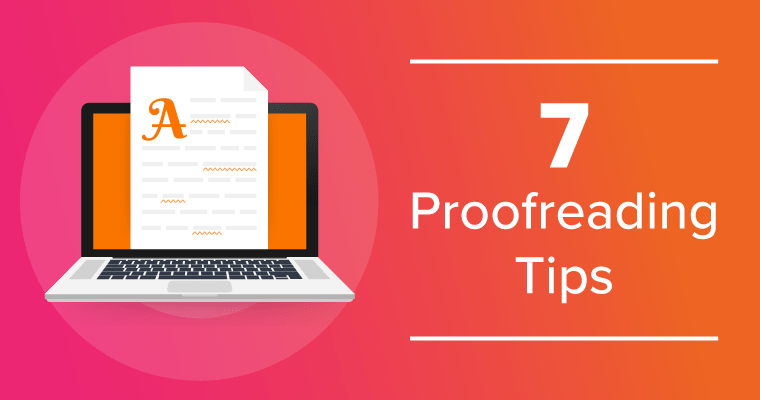Special thanks to Aimee Laurence for this guest post!
Some bloggers seem to have a natural talent for readable, punchy prose. Readers love their blog posts and they have plenty of engagement.
However, this doesn’t come naturally. Whoever your writing hero is, their writing is probably just as bad as yours before it goes through an edit. What they really know well is the editing and proofreading process, where they make their ideas sound superb in writing.
Here are seven editing and proofreading tips that can help you make your writing more economical and attractive:

1. Cut filler words.
This is one of the most important proofreading tips. You should cut all grammar expletives from your blog posts. If you are not familiar with the term, these are all literary constructions that start with
Here,
There or
It followed by a form of the verb to be. Common forms are
It is,
It was,
There is,
There will be,
It takes,
It won’t and so on. These only weaken the writing by moving the main focus away from the focus of the sentence. They often require support words like who, that, when - these words dilute your writing even more. Train yourself to spot them and then remove them to make the prose meatier and better.
2. Avoid weak verbs.
This is related to
it,
here,
there, and creates some weak sentences as well. Instead, you should use verbs that truly express what you mean, that express some action. For instance, use
Offer instead of
Give Out,
Discover instead of
Find out, or
Clarify instead of
Make it clearer.
3. Don't use weak phrases.
Weak adjectives can make your sentences weak as well. When you want your blog posts to shine and stand out, you need to use strong adjectives, the strongest and the most accurate you can think of.
Replace
Really bad with
Terrible,
Really good with
Great,
Very Big with
Huge, etc. In general, look for every instance of
very and
really next to an adjective and remove it by changing the adjective and making it stronger.
Sometimes adjectives can be made stronger even if there isn’t a pesky
really or
very. For instance,
dirty can be made into
filthy for more impact in some cases.
4. Trim colloquialisms and buzzwords.
“Readers have no time for this. So, remove phrases like: the fact of the matter is, absolutely, you are going to have to, due to the fact, every single person and so on,” says Ashley Bridges, an editor at
OXEssaysOpens in a new window to a reference source".
5. Avoid nominalization.
Nominalization is what happens when writers use a weak noun equivalent when there is a stronger verb available. They usually introduce many other unnecessary words. For instance:
Give your blog post a proofread. Instead, you should use:
Proofread your post. It’s simpler, more economical, and uses fewer words.
6. Use noun modifiers.
This technique is not used often, but you should know about it because it makes for great material for headlines. When you put two nouns together and the first noun modifies the second one, this cuts unnecessary words from your post. For instance:
Editing tips,
Traffic-boosting advice,
Registration information, and so on.
7. Use online tools.
Writers often need help, no matter how skilled they are in the art of writing. By using the following proofreading tips and tools it can be easier for you to have an online ally that can find and fix your mistakes for you. In that spirit, here are a few tools that can help:
Keep editing your post accordingly until you get it to look as you want. It’s important to understand that until you edit, your post is just a diamond in the rough.
We hope you enjoyed these 7 proofreading tips.
Aimee Laurence is a marketer at UK Custom Essays and BoomEssays websites. She writes about career and dental health. Also, Aimee is a freelance HR at Essayroo portal. For more information about Roadside Dental Marketing please get in touch with us, or learn more about our custom content packages we have available.

